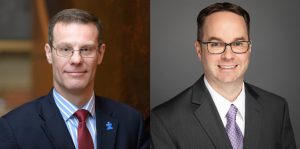SPARC Webinar: September 23
Trace Explosives Sampling for Security Applications (TESSA): A Contact Sampling Task Order

with Prof. Steve Beaudoin, Professor of Chemical Engineering, Purdue University and Alan Smith, Analytical Laboratory Manager at Signature Science, LLC .
The slides and video presentation of the September 23rd webinar is now available online!
The last webinar of the SPARC (Seminars to Promote ALERT Research and Collaboration) Webinar summer series will conclude on September 23rd from 11:30am – 12:00pm EDT. More information on the presentation can be found below:
Title: Trace Explosives Sampling for Security Applications (TESSA): A Contact Sampling Task Order
Presenters: Prof. Steve Beaudoin, Professor of Chemical Engineering, Purdue University and Alan Smith, Analytical Laboratory Manager at Signature Science, LLC
Abstract:
A round robin contact sampling study has been undertaken involving Purdue University, New Mexico Tech, the University of Washington at Seattle, Signature Science, and the DHS Transportation Security Laboratory. In this study, explosive threat residues are created at TSL and disseminated to the three university performers. These performers transfer these threats to common substrates representative of air transportation security settings, using a meticulously documented approach. Various model and commercial off the shelf traps are then used to harvest the threats from the surfaces under carefully controlled conditions, and the traps are shipped to Signature Science where a details analytical chemistry workup is performed to determine the extent of residue recovery. The goals of this study are to: 1) provide a direct comparison of the effectiveness of the various traps at recovering residue, 2) identify aspects of the threats, surfaces or traps that seem most significant to the recovery, and 3) establish a common approach for the community to use to assess new traps and new contact sampling procedures. As anticipated, threat recovery is highly stochastic, and appears to correlate most strongly with the nonuniformity of the traps and contaminated surfaces.
Speaker Bios:
Stephen P. Beaudoin is a Professor in the School of Chemical Engineering at Purdue University, where he also serves as the Director of the Purdue Energetics Research Center (PERC), a multidisciplinary research center that supports research across the DoD, DOE, and DHS. Beaudoin has published more than 100 articles in the refereed literature, with a focus on particle and powder adhesion in energetic materials engineering, detection and processing; and in microelectronics, food, and pharmaceutical manufacturing. He serves as the Leader of the Trace and Vapor Sensors Research Thrust in ALERT (Awareness and Localization of Explosives-Related Threats), a U.S. Department of Homeland Security-sponsored Center of Excellence in Explosives Research. He also serves as Academic Director of the Dual MS in Defense Engineering and Technology degree program, which is jointly offered by Purdue and Cranfield University (UK).
Mr. Alan Smith serves as the Analytical Laboratory Manager at Signature Science, LLC where he oversees the operations and maintenance of the Chemical Analysis Resource Center (CARC) at the Austin, TX campus. Additionally, he is the principal investigator and lead analyst on various projects throughout the Chemical Sciences Division and is involved in project and experiment planning, including interfacing with external clients, industry experts, and members of academia. Mr. Smith supports various projects in chemical forensics and synthesis by utilizing the mass spectrometers at Signature Science. This involves ground-up chemical identification and method development for extensive chemical attribution signature studies. This also includes developing data handling and acquisition methods for various proteomic and peptide based studies, as well as the chemometric tools and software used to analyze data. He also continues to design and deliver training courses for various government clients in the areas of chemical weapons, explosives, and analytical chemistry.
If you are interested in attending or have any questions, please reach out to Tiffany Lam at [email protected] for more information.

There are currently no comments.
The comments are closed.